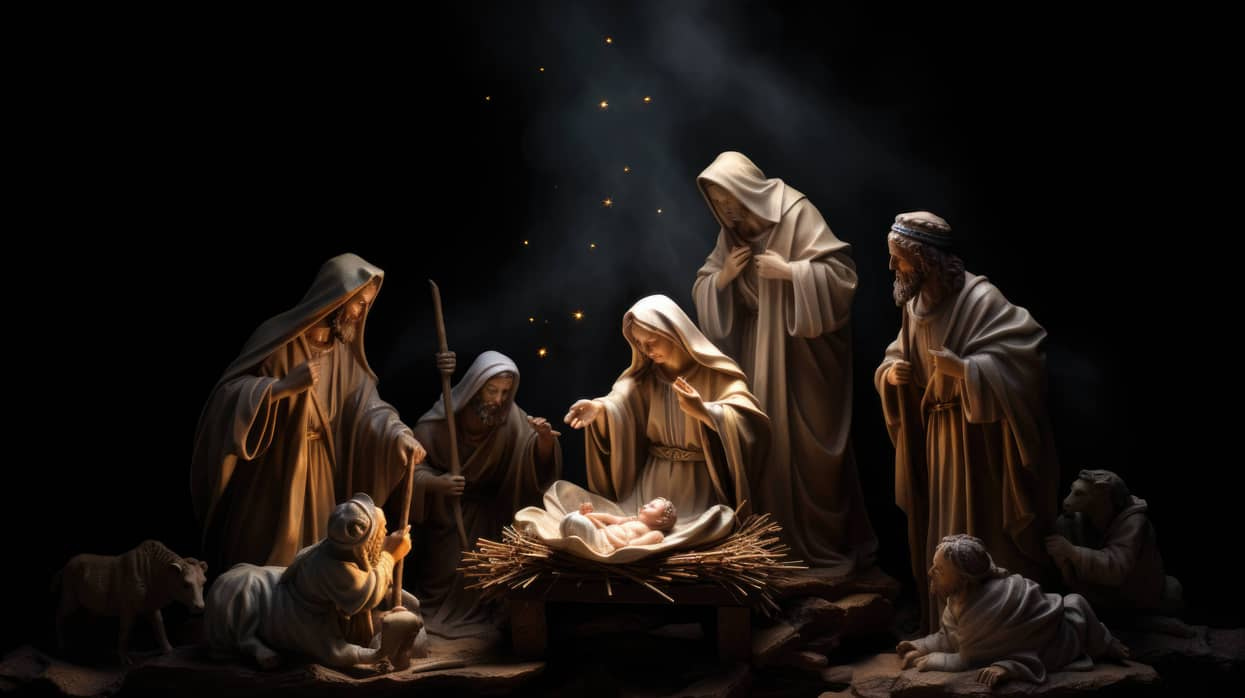Christmas and The Imprint of Eternity
Jesus Christ’s manifestation of the divine and eternal into the temporal world changed History itself. By celebrating His birth, we too help bring forth a real tangible impact on the world.

This summer, I wrote an independent Substack piece titled “History is a Rubber Band, not a Steel Pipe,” in which I (through the overuse of the word bend) tackled a common problem in the modern interpretation of historical progress. Prompted by Francis Fukuyama’s essay, “The End of History,” I took on the far too common assumption prevalent in society today that history is pre-determined—that the arc of history bends in a certain way and that we are merely subject to its forces. Instead, as noted above, I argued that the way history weaves is actively determined by the choices we make. Nothing is inevitable unless we believe it so.
In light of the Christmas holiday and the fact that I am currently reading Fukuyama’s extended thesis on the matter, I want to turn to a favorite philosopher of mine and my favorite essay of his. In the spring 1968 edition of Modern Age, political philosopher and National Review editor Frank Meyer published “Western Civilization: the Problem of Political Freedom.” He describes the origins of the civilizational order of the West, from its origins in Hellenic and Judaic culture to its culmination in the founding of the United States of America.
These two separate civilizations were bound together, in Meyer’s view, by the Incarnation. Borrowing a phrase from the philosopher Eric Voegelin, Meyer viewed this “flash of eternity into time” as the birth of not merely a new civilization—Christendom, and later the West—but of a new historical order as well. Time had begun anew, revolving around the physical manifestation of Yahweh in the form of Jesus Christ. The progress of History would be guided by this flash from that point on. Meyer writes this:
“The Incarnation, understood as the ‘flash of eternity into time,’ the existential unity of the perfect and the imperfect, has enabled men of the West to live both in the world of nature and in the transcendent world without confusing them.”
-Frank Meyer
What this means for the individual is discussed at length in Meyer’s essay, and I encourage all to read it. What I am interested in here, however, is how the “flash of eternity into time” impacted History itself. Why was the Incarnation so important, not merely for the creation of Western civilization or the saving of souls (for I, being Catholic, believe in the Incarnation’s truth), but for the nature of the historical narrative itself?
To begin to answer this, let me reformulate Meyer’s and Voegelin’s turn of phrase. Rather than conceiving of the Incarnation as a momentary flash of the eternal spark into time, let us think of it as an imprint. Jesus Christ’s manifestation of the divine and eternal into the temporal world changed History itself. It imprinted, in real (if mystical-sounding) ways, eternity unto the passage of time itself. God’s Providence had always existed, but through his arrival in this world, this Providence was universalized and consecrated in the souls of men. For the first time, God’s plan for mankind would be determined in part by mankind, the Christian historical narrative shaped by Christian souls.
Just as the nature of History itself was impacted by the imprint of eternity unto time, so too is it changed as this imprint fades. There is no question that Christianity’s role in the world today has diminished, both in the West and globally. The secularization of the Christian tradition into Western liberalism has borne a number of blessings that we should be grateful for; the material prosperity of the West that comes from our understanding of every man as equal is spectacular in historical terms. But these changes cannot maintain themselves. Fukuyama notes this in The End of History:
“The social contract between rational self-interested individuals was not, in other words, self-sustaining; it required a supplementary belief in divine rewards and punishments.”
-Francis Fukuyama
This is not by accident. It is God’s recognition of men as equal in his eyes that makes liberal social contracts possible. Without this understanding—and without widespread recognition that these divine truths are, in fact, true and not merely useful metaphors—the impetus behind the greatness of modernity fades. As the imprint of eternity unto time recedes, so too does the moral order from which the West and all her blessings spring. The arc of history has bent towards these things because much of mankind upheld and maintained this divine imprint. Much like a hand imprint on a mattress, the presence of the eternal on this mortal coil fades if it is not continuously pressed into it.
All of this is to say, this Christmas, as you sit down with loved ones and celebrate the birth of Jesus Christ, you are not merely celebrating the saving of your individual souls. Your celebration of Christ and of the moral order he brought forth has a real tangible impact on the world and on how the world progresses. You are, quite literally, changing History itself.
Merry Christmas, everybody!
Scott Howard is an undergraduate student at the University of Florida. An alumnus intern of National Review, he is currently an Editor at Lone Conservative and volunteers as an Associate Editor for the Freemen News-Letter. @ConservaMuse



